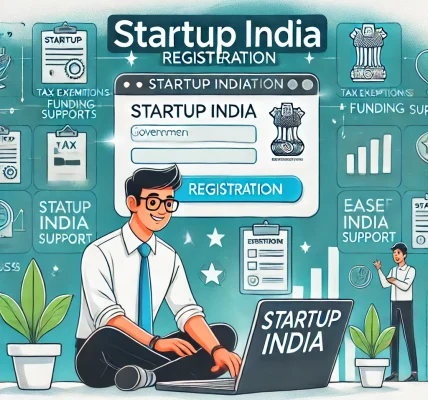Starting a new business is an exciting journey, but it often requires a significant financial investment. Whether you’re launching a tech startup, a manufacturing business, or a service-based enterprise, funding is one of the most critical aspects to consider. As a startup founder, you will inevitably face the decision of how to fund your business in the most efficient way. Two of the most common sources of funding are government funding and private investment.
In this article, we will compare government funding and private investment, exploring their advantages and drawbacks. We’ll discuss how each option can impact your startup and provide valuable insights to help you make an informed decision that aligns with your business goals.
1. Understanding Government Funding for Startups
Government funding refers to financial assistance provided by the government to encourage entrepreneurship and economic growth. In India, the government has launched several schemes aimed at supporting startups, especially those in the Micro, Small, and Medium Enterprises (MSME) sector.
Types of Government Funding:
- Grants: Non-repayable funds given to startups to support their initial phase of growth.
- Subsidies: Financial assistance that reduces operational costs, making it easier for startups to scale.
- Loans: Low-interest or interest-free loans to help startups cover their initial capital requirements.
- Tax Incentives: Government policies that offer tax reductions or exemptions to startups for a certain period.
Popular Government Schemes for Startups:
- Startup India Scheme: Provides various benefits such as tax exemptions, funding opportunities, and ease of doing business.
- Mudra Yojana Scheme: Offers loans to small businesses and startups with minimal documentation requirements.
- Technology Upgradation Schemes (CLCSS and TUFS): Financial assistance for adopting modern technology and machinery.
- Credit Guarantee Fund Trust for Micro and Small Enterprises (CGTMSE): Provides credit guarantees to financial institutions offering loans to MSMEs.
Advantages of Government Funding:
- Non-Equity Based: Most government funding options are non-equity-based, meaning you don’t have to give up ownership of your business.
- Low-Cost Capital: Government loans and grants often come with lower interest rates or no interest at all.
- Focus on Growth and Development: Government funding is generally geared toward fostering growth and innovation in startups rather than focusing on short-term profits.
- Less Risk: Since government grants and loans are often non-repayable or carry low interest, they generally carry less financial risk for startups.
Disadvantages of Government Funding:
- Lengthy Application Process: Applying for government funding can be a time-consuming process with a lot of paperwork and compliance requirements.
- Eligibility Criteria: Not all startups are eligible for government funding. Often, only businesses in specific sectors or with innovative business models are considered.
- Limited Flexibility: Government funding can come with strict terms and conditions, which may limit how you can use the funds or grow your business.
2. Understanding Private Investment for Startups
Private investment, on the other hand, refers to capital provided by private individuals, companies, or venture capitalists who are willing to invest in startups in exchange for ownership equity or a stake in the business.
Types of Private Investment:
- Angel Investors: High-net-worth individuals who provide early-stage funding to startups in exchange for equity or convertible debt.
- Venture Capitalists (VC): Professional investors who fund startups with high growth potential in exchange for equity. VCs typically come in when the startup is scaling and needs substantial capital.
- Private Equity (PE): Investment firms that provide capital to mature businesses or startups for expansion or restructuring.
- Crowdfunding: A method of raising small amounts of money from a large number of people, usually through online platforms.
Advantages of Private Investment:
- Quick Access to Capital: Unlike government schemes, private investment can be obtained quickly, allowing startups to capitalize on opportunities without delay.
- Expertise and Mentorship: Angel investors and venture capitalists often bring in valuable industry experience, mentorship, and strategic guidance to help startups scale.
- Potential for Larger Investment Amounts: Private investors are often willing to invest larger amounts of money than what is available through government schemes, which can be crucial for rapid growth.
- Flexible Terms: Private investors may offer more flexible terms when it comes to how the funds are used, unlike the restrictions often associated with government funding.
Disadvantages of Private Investment:
- Equity Dilution: In exchange for funding, private investors typically require a share in your business. This means you’ll be giving up some ownership and control over your company.
- Pressure to Perform: Investors expect a high return on their investment. This can lead to significant pressure on startup founders to meet growth targets and generate profits quickly.
- Long-Term Commitments: Venture capital and private equity investments often come with long-term commitments, which may limit the founders’ ability to make independent decisions.
- Exit Strategy Requirements: Private investors usually expect an exit strategy, such as an IPO or acquisition, within a specific timeframe. This could result in the sale of your company if not handled properly.
3. Key Differences Between Government Funding and Private Investment
Let’s break down the key differences between government funding and private investment to help you determine which is best suited for your startup:
| Aspect | Government Funding | Private Investment |
|---|---|---|
| Source of Funds | Government bodies and schemes | Private investors (angel investors, venture capitalists, etc.) |
| Equity Dilution | No equity dilution (non-equity based) | Equity dilution required (you give up ownership) |
| Loan Repayment | Low-interest loans or non-repayable grants | Loan repayment with interest or equity-based returns |
| Application Process | Lengthy and paperwork-intensive | Faster approval process |
| Flexibility | Often comes with strict conditions and limitations | More flexibility in how funds are used |
| Risk | Less financial risk for startups | Higher financial risk due to equity demands and expectations |
| Support and Mentorship | Government agencies provide basic guidance | Private investors often provide mentorship and networking opportunities |
| Long-Term Impact | Long-term support for growth without much immediate pressure | Pressure for rapid growth and high returns on investment |
4. Which Option Is Better for Your Startup?
When deciding between government funding and private investment, several factors come into play:
- Stage of Your Startup: If you are in the early stages and need capital with less pressure on growth, government grants and subsidies might be more suitable. On the other hand, if you are looking to scale quickly and need substantial capital, private investment might be the better option.
- Ownership Preferences: If retaining control over your business is important to you, government funding is the better choice since it doesn’t require giving up equity. Private investment, however, may require you to dilute your ownership.
- Risk Tolerance: If your startup is in a high-risk industry with uncertain returns, government funding offers a lower-risk option. Private investors, however, may expect faster returns and could exert pressure on you to perform quickly.
- Mentorship Needs: If you value guidance and industry connections, private investors can be invaluable. Government funding tends to focus more on financial support and less on mentorship.
5. Conclusion
Both government funding and private investment offer unique advantages and come with their own set of challenges. Government funding is ideal for startups that need low-cost, non-equity-based capital and are looking for long-term growth support. Private investment, on the other hand, provides quicker access to larger amounts of capital, along with the possibility of mentorship and guidance to help you scale faster.
Ultimately, the decision between government funding and private investment depends on your startup’s current needs, future goals, and the amount of control you wish to retain. Many successful startups use a combination of both—starting with government schemes for initial growth and moving toward private investors as they scale.
By weighing the pros and cons of each option, you can select the best funding strategy for your startup, ensuring that your business has the resources it needs to thrive in the competitive market.




